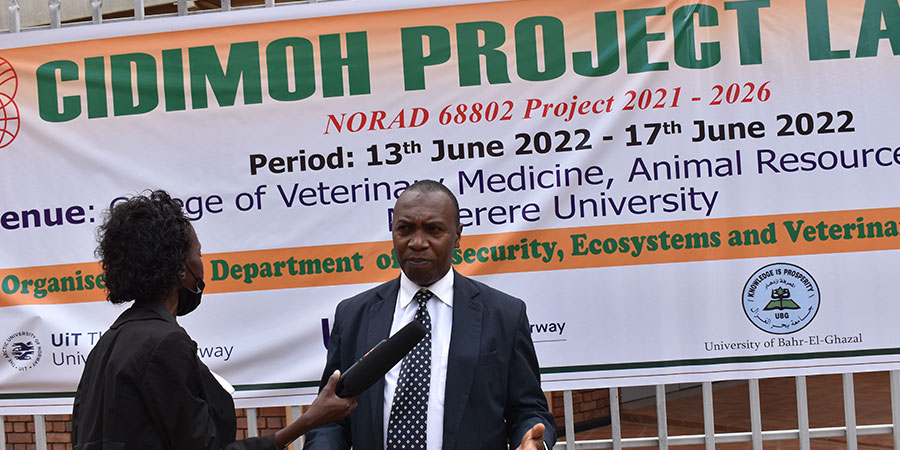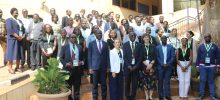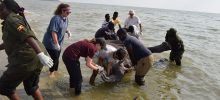Climate Change and Infectious Diseases, A One Health Approach project launched at CoVAB.
Makerere University College of Veterinary Medicine, Animal Resources and Bio Security (CoVAB), in collaboration with the University of Tromsø (UiT) Norway, University of Bahr El Ghazal (UBG) South Sudan, and University of South-Eastern Norway (USN) is set to implement the Climate Change and Infectious Diseases – A One Health Approach (CIDIMOH)project.
The six-year project supported by the Norwegian Agency for Development Cooperation (NORAD) under the Norwegian Program for Capacity Building in Higher Education Research for Development (NORHED II) was launched on 13th June 2022.
One of the major outputs of the project will be the development of a critical mass of skilled human resources that will support the development of innovative interventions in teaching and research for the future management of infectious diseases. A total of 6 multi-disciplinary PhDs, 6 Masters students were to be supported by the project. Staff was to be offered Post Doc research opportunities and there were plans to run diploma and short courses for varied professionals.
The project will also enhance sustainable and multi-disciplinary scientific networks across communities, institutions, and countries to better address climate change and zoonotic diseases and promote strong community-driven engagement strategies aimed at establishing a two-way understanding, communication, and exchange of knowledge on the challenges and sustainable solutions to climate change and infectious diseases in Uganda and South Sudan.
The Vice-Chancellor Makerere University, Prof. Barnabas Nawangwe who was represented by Deputy Vice-Chancellor Finance and Administration Prof. Henry Alinaitwe officiated at the launch that was attended by representatives from the partner Universities. In his address, the Vice-Chancellor commended the great contribution the project was set to make in the areas of capacity building and curriculum review. He pointed out that the project was relevant given the many diseases that were coming up due to changes in the ecosystem and hence the need to put in place measures to address them. He expressed the university’s commitment to supporting the project through close supervision as well as infrastructure for the staff and the students.
Dr. Clovice Kankya, Head of the Department of Biosecurity, Ecosystems and Veterinary Public Health at the College of Veterinary Animal Resources and Biosecurity (CoVAB) said some of the major outputs of the project would be the establishment of a center of excellence that will coordinate and provide solutions to climate change and zoonotic diseases management in the countries. He said the effort will be made to ensure a community-driven platform that would help create awareness involving the youths, children, and women in key hotspot areas in Uganda and South Sudan. The Community aspect he said, will also be key in implementing this fight through engagements, awareness programs, provision of documentation in form of brochures, books, and others, and sensitizing them on the dos and don’ts of controlling Zoonotic diseases.
Prof. Morten Tryland the Principal Investigator from The Arctic University of Norway revealed that the Norwegian government had donated 10 million Norwegian Kroner to run activities in the 6 years CIDIMOH project. He said the decision to collaborate with Makerere University and the University of Barl El Ghazal was for purpose of combining expertise in infectious biology and social sciences to come up with one approach to this project. About smallpox, Tryland mentioned that the disease directly falls into zoonotic diseases (animal to human spread) and that it spreads through contact but can be avoided. He said it is identified when someone has skin rashes, fever then blisters on the skin however gave hope that it can be vaccinated against.
Prof. Ambrose Samuel Jubara, University of Barl El Ghazal, South Sudan noted that close to 85% of South Sudanese were illiterate and the majority pastoralists with little knowledge about zoonotic disease, this project would offer solutions to some of the challenges they face.
“South Sudan is a museum of zoonotic disease, animals and people can even reach the extent of dying before detecting that they are suffering from such diseases”. He noted. This project will help us create awareness, capacity building and devise possible means of countering these diseases from majorly our pastoral communities and the entire population of South Sudan, we are so optimistic that the 6 students on masters and PhD will be a magic bullet to end this.
Some of the student beneficiaries of this project James Muleme pursuing a Ph.D in Public Health from Makerere University school of Public Health under department of Disease Control and Environmental Health and Peter Michael Marin from University of Barl El Ghazal believed that at the end of the project, they would be able to provide explanations about the possible roots of resistant germs which will help their countries
PICTORIAL
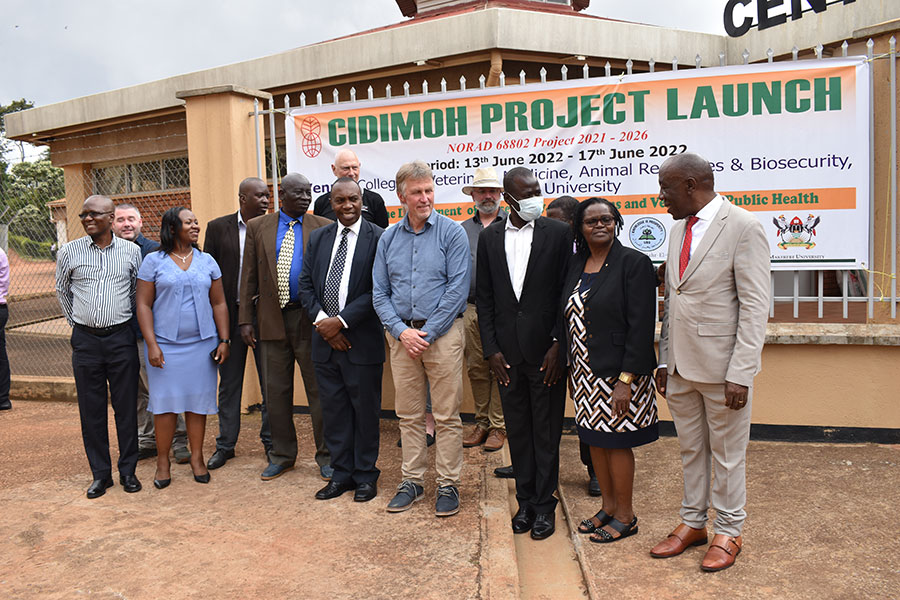
Participants at the Launch take a group picture
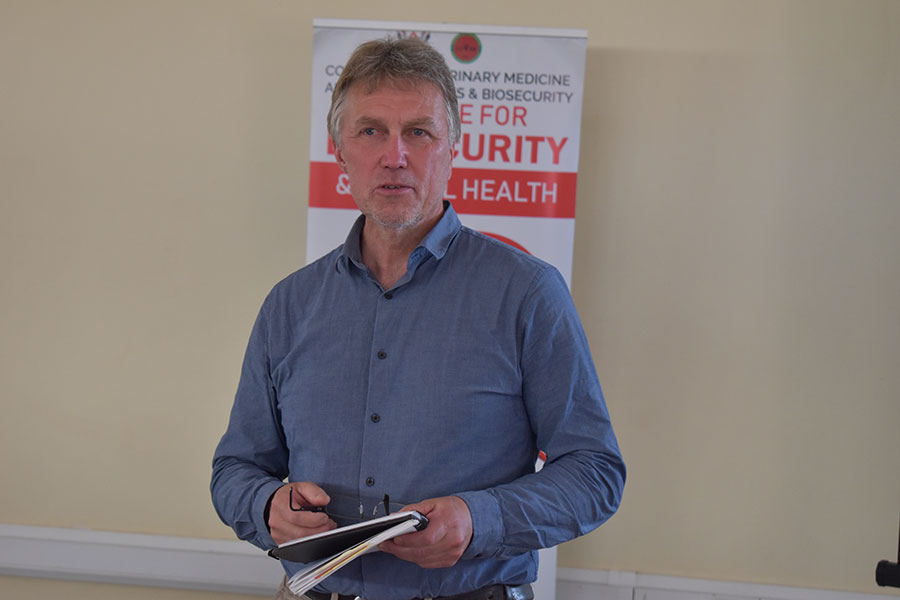
Prof. Morten Tryland , The Principal Investigator
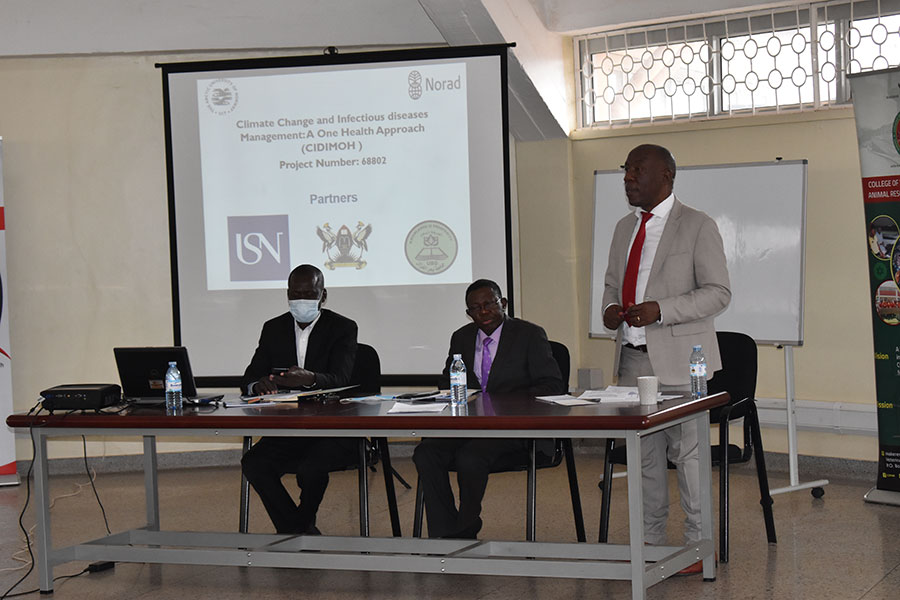
The DVC F&A Prof. Henry Alinaitwe addresses stakeholders at the event.
Story by Harriet Musinguzi.


